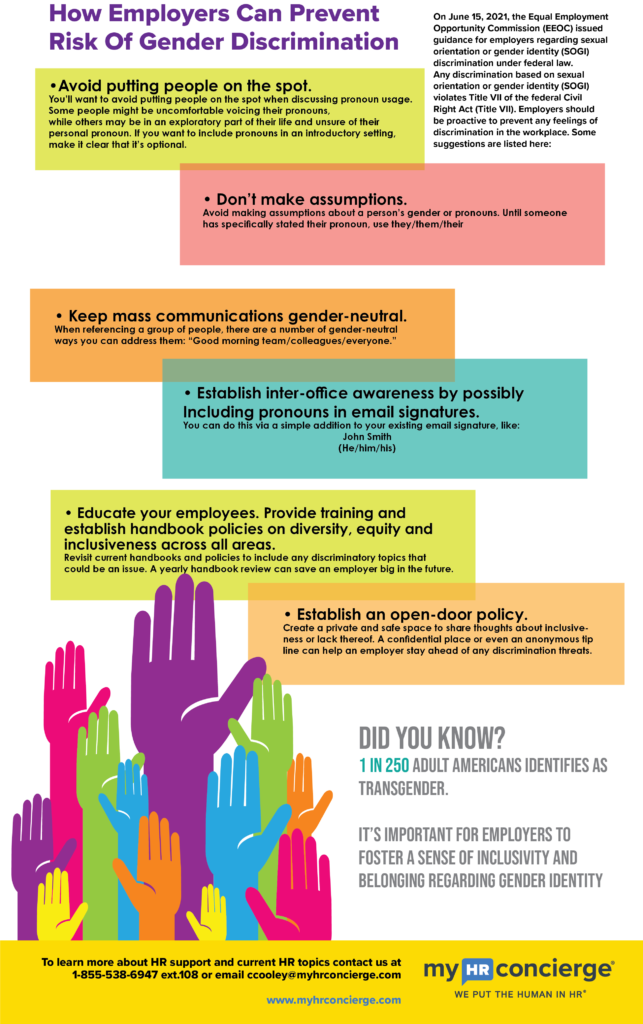He Said, She Said, We Said… Gender Sensitivity In The Workplace
Last Updated on January 13, 2022
How Employers Can Prevent Gender Discrimination
Our workplace continues to change, with diversity and inclusivity in the forefront. One element of diversity, equity and inclusivity (DEI) is gender identity and acknowledgement of an employee’s preferred pronouns. More employees are entering the workplace with gender identities and expressions that are different than what we may expect when we discuss gender, creating a need for more understanding.
Diversity of gender expression continues to emerge, beyond historic binary options, in the modern workplace, challenging traditional policies.
Why it is Important for Employers to be Sensitive to Gender
The U.S. Supreme Court has ruled that discrimination on the basis of sexual orientation or gender identity is also “because of sex” as prohibited under Title VII. Therefore, it is important that employers are sensitive to employees preferred gender pronouns. Failure to do so could lead to discrimination or hostile work environment claims. Read the EEOC’s position.
What are Gender Pronouns?
Gender pronouns signify how someone would like to be referenced in conversation. Gender now goes beyond a few letters on a birth certificate and has evolved into
Some examples of personal pronouns used for different groups and identities:
- He/him/his: Male pronouns
- She/her/hers: Female pronouns
- They/them/theirs: Gender-neutral group pronouns and singular pronouns as well
- The list of pronouns is evolving, with the above representing some of the most common ones. Keep this in mind as there’s a chance you’ll encounter new neutral pronouns.
Did you know? 1 in 250 adult Americans identifies as
transgender.
How Can Employers Mitigate Their Risk of Discrimination
On June 15, 2021, the Equal Employment Opportunity Commission (EEOC) issued guidance for employers regarding sexual orientation or gender identity (SOGI) discrimination under federal law. Any discrimination based on sexual orientation or gender identity (SOGI) violates Title VII of the federal Civil Rights Act (Title VII). Employers should be proactive to prevent any feelings of discrimination in the workplace. Some suggestions are listed below:
Avoid Putting People On the Spot
You’ll want to avoid putting people on the spot when discussing pronoun usage. Some people might be uncomfortable voicing their pronouns, while others may be in an exploratory part of their life and unsure of their personal pronoun.
If you want to include pronouns in an introductory setting, make it clear that it’s optional.
Don’t Make Assumptions
Avoid making assumptions about a person’s gender or pronouns. Until someone has specifically stated their pronoun, use they/them/their.
Keep Mass Communications Gender-Neutral
When referencing a group of people, there are a number of gender-neutral ways you can address them: “Good morning team/colleagues/everyone.”
Establish Inter-Office Awareness by Possibly Including Pronouns in Email Signatures
You can do this via a simple addition to your existing email signature, like:
John Smith
(He/him/his)
Hiring Manager
Educate Your Employees
Provide training and establish handbook policies on diversity, equity, and inclusiveness across all areas. Revisit current handbooks and policies to include any discriminatory topics that could be an issue. A yearly handbook review can save an employer big in the future.
Establish an Open-Door Policy
Establish an open-door policy to create a private and safe space to share thoughts about inclusiveness or lack thereof. A confidential place or even an anonymous tip line can help an employer stay ahead of any discrimination threats.
Download Our Infographic on Preventing Gender Discrimination

MyHRConcierge Can Help You Create a Gender Sensitive Workplace

